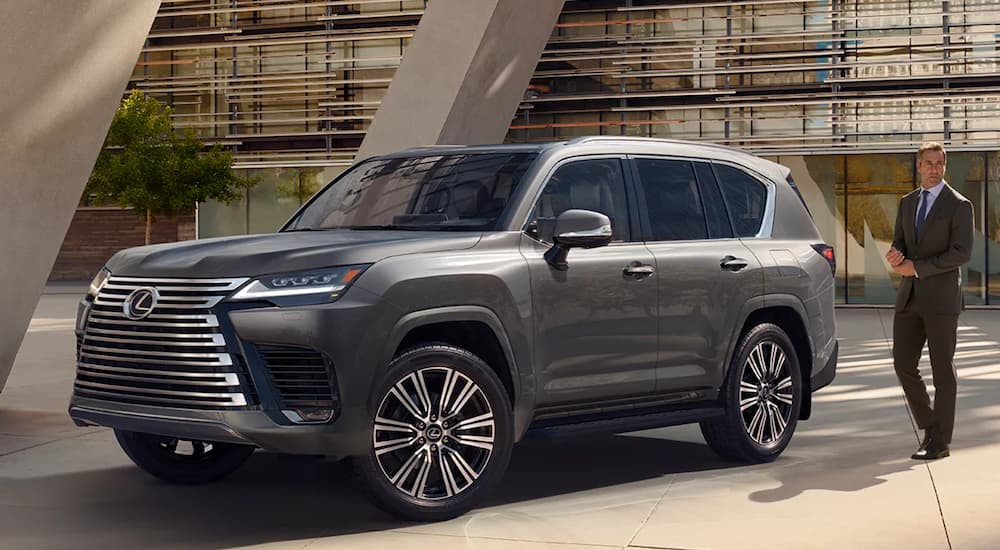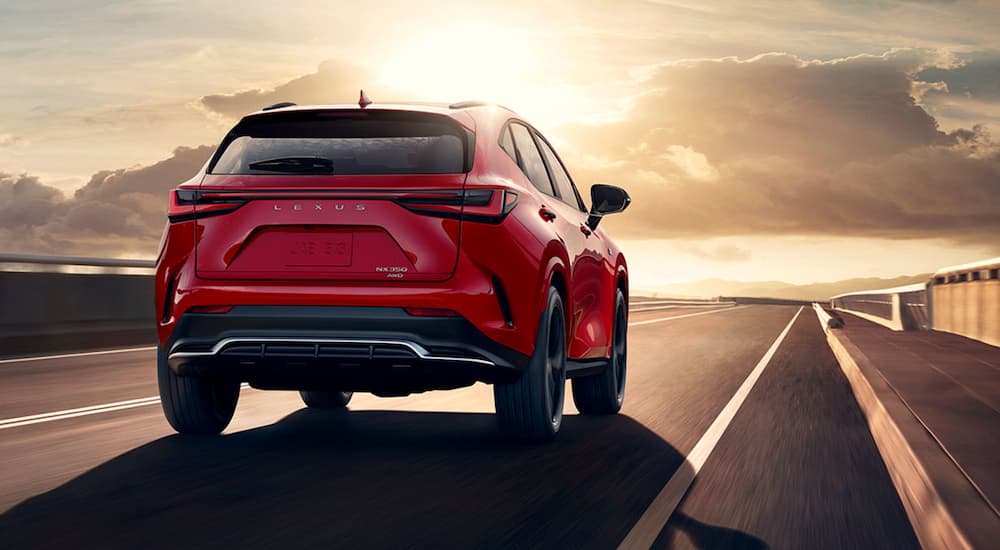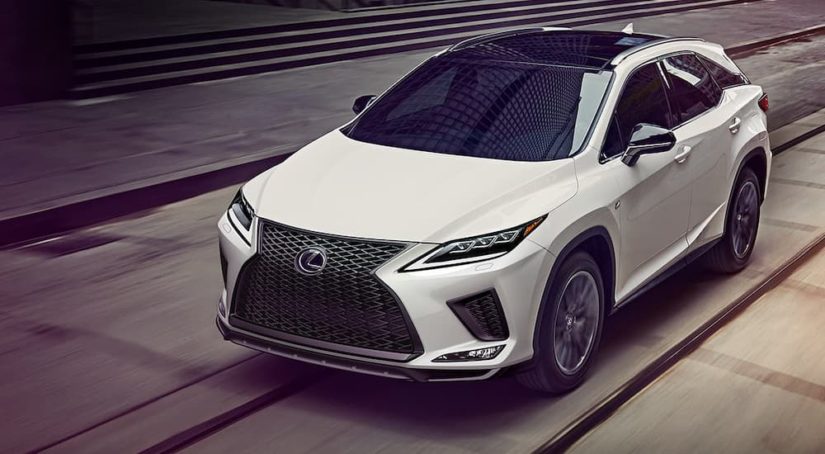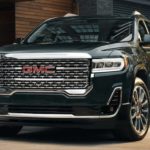Lexus is a brand of many firsts. Not only was it the first Japanese luxury brand in the American market, it was the first luxury brand to release an SUV. Since the 1996 Lexus LX kickstarted the modern luxury SUV craze, we have seen every luxury brand on the market release their own models for the segment, with even Lamborghini and Ferrari putting aside sports cars to cash in on the trend. However, despite the competition, Lexus remains the top-seller in the market that it created, delivering some 227,487 luxury SUVs to Americans last year–tens of thousands more than either Mercedes or BMW. Why have Lexus SUVs proven so popular? What do they offer that the prestigious European brands cannot provide?
Staying True to Their Roots
While it may be easy to forget in the sea of inoffensive crossovers crowding city streets and highways, the popularity of SUVs originally came from their rugged do-it-all nature. The original Lexus LX was not a sleek model that sold based on its top speed or 0-60 time; it was a more comfortable version of the literally bulletproof Toyota Land Cruiser. This was a luxury vehicle that you could count on to start every time, to handle any weather, and to bring the whole family with you in comfort. Those were all new qualities in a market where luxury was increasingly synonymous with track performance, and a long list of features would start malfunctioning soon after the warranty period ended.
Today, Lexus remains true to that original philosophy. Its SUV models are rarely the fastest or the most feature-rich on the market, but they retain a level of practicality and reliability that you simply won’t find with other luxury brands. Just pull up your preferred measurement of brand reliability, and Lexus will be at the top of the list. In JD Power’s recent 2021 Vehicle Dependability Study, for example, Lexus took first place while BMW came in 11th, Mercedes 15th, and Audi 20th. Consumer Reports had slightly different rankings for 2021, but they followed the same general pattern, with Lexus taking 3rd place while the three German brands came in 12th, 14th, and 20th.
When the other luxury brands realized they needed to jump on the SUV bandwagon, they didn’t really understand what made SUVs popular. They assumed that luxury SUV buyers wanted the same things as sport sedan buyers and set about designing the fastest and most feature-rich SUVs possible. They certainly succeeded at their aims, with spectacular vehicles like the BMW X6 M or the Mercedes-AMG GLE 63 S. Building an SUV with 617 horsepower and a 3.8 second 0-60 time is simply incredible–but is it what most buyers are looking for? Lexus doesn’t think so, and the fact that the Lexus RX (which tops out at just 308 horsepower and a 7.7-second 0-60 time) outsells the BMW X6 and X5 combined by a 5 to 1 margin suggests that the Japanese brand knows what it is doing.

Five Flavors of Luxury
Today, Lexus sells five luxury SUV models. While the naming scheme is far less transparent than those of some other luxury brands, Lexus sticks with what works and doesn’t make major changes to its lineup often. Indeed, its best-selling RX and top-of-the-line LX models have maintained their positions in the Lexus family since their introduction in the late 1990s. Lexus also doesn’t clutter its SUV lineup with performance variants or other confusing alternatives to its main models. Each of the five models has a distinct identity, and there is little overlap to puzzle buyers.
Lexus LX: The largest model in the Lexus lineup, the LX continues to share its bones with the Toyota Land Cruiser, providing unmatched reliability and some impressive off-road performance. Despite being the oldest nameplate in the Lexus family, the LX was completely redesigned for the 2022 model year. It remains a traditional body on frame design but trades its old V8 for a far more powerful turbocharged V6.
Lexus GX: Introduced for 2003, the GX is a midsize model based on the Toyota 4Runner, offering traditional SUV construction and performance for drivers who do not need the bulk of the LX. However, the GX was last redesigned for the 2010 model year and, despite a refresh in 2020, it is beginning to show its age. While its reliability and capability remain impeccable, drivers seeking a more refined experience should look elsewhere.
Lexus RX: The RX makes up roughly half of all Lexus SUV sales for good reason–it is an excellent all-around vehicle that epitomizes the Lexus brand. While car enthusiasts and professional reviewers may look down on the RX for its average acceleration and soft handling, those are the very features that endear it to so many buyers. The RX is built for comfort, reliability, and practicality and delivers exactly that.
Lexus NX: The Toyota RAV4 has been the best-selling SUV in America for five years running, so it’s no surprise that Lexus decided to bring some of that magic to its lineup. The Lexus NX was first introduced for 2015 and fully redesigned for 2022. Although based on the RAV4 platform and sharing its practicality, the NX is filled with more than enough luxury features to satisfy the discerning buyer.
Lexus UX: Small SUVs are big right now, and the Lexus UX is designed for drivers looking for the full luxury SUV experience in a more manageable package. Added to the lineup for the 2019 model year, this subcompact model stands out for its sharp looks and plentiful features almost as much as its nimble handling and more than reasonable price tag.

Lexus Electrifies
Today, even luxury buyers are interested in cutting back on their gasoline consumption, and Lexus has made good use of Toyota’s world-leading hybrid technology to develop a line of more fuel-efficient luxury SUVs. Today, the RX, NX, and UX all offer hybrid versions, with the two smaller models offering an impressive 39 MPG combined. For even greater efficiency, the NX is also available as a plug-in hybrid with a range of 37 miles on battery power alone. However, these hybrids are worth considering, even if good fuel economy is not at the top of your list of desired features.
Unlike many other luxury SUV brands, where the hybrid models are slower and less capable than their high-performance pure gasoline counterparts, Lexus has focused on building hybrids that offer the same level of power and dependability as its traditional gasoline models. In fact, for all three Lexus SUVs that offer the option, the hybrid powertrain is actually the most powerful version, and every Lexus hybrid SUV comes standard with all-wheel drive for reliable all-weather performance. So when you are choosing which trim to take home, make sure you test drive a hybrid before you make your decision.
Is a Lexus SUV Worth Buying?
For many drivers, luxury brands can have a bit of a bad reputation. The popular European brands that dominate most segments of the luxury market are known for expensive operating costs and finicky reliability. While their models certainly offer a level of power and handling that can justify their high price tags for performance-oriented drivers, the buyer who is simply shopping for a trustworthy family vehicle may think of a BMW or a Mercedes as more of a costly status symbol than a good investment. That is the buyer that should consider a Lexus SUV instead. The Japanese brand builds genuine luxury vehicles that are dependable as well as stylish, staying true to the original role of the SUV as a rugged do-it-all machine. Even if you would not normally consider buying a luxury SUV, Lexus may just change your mind.



